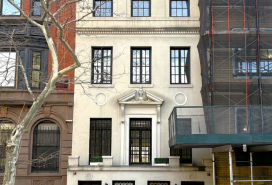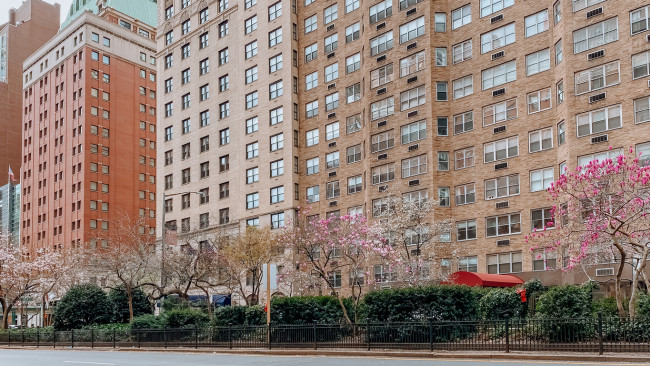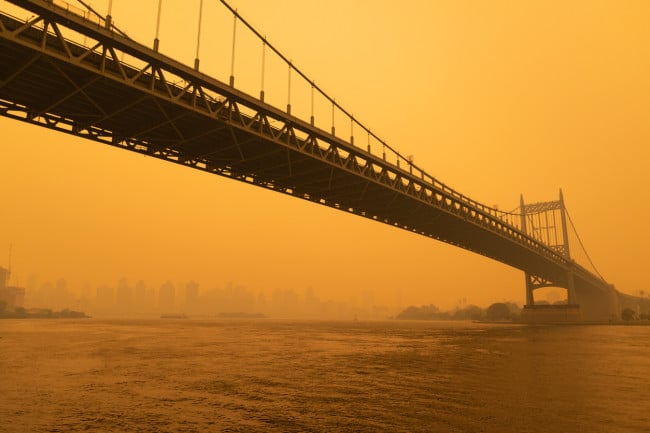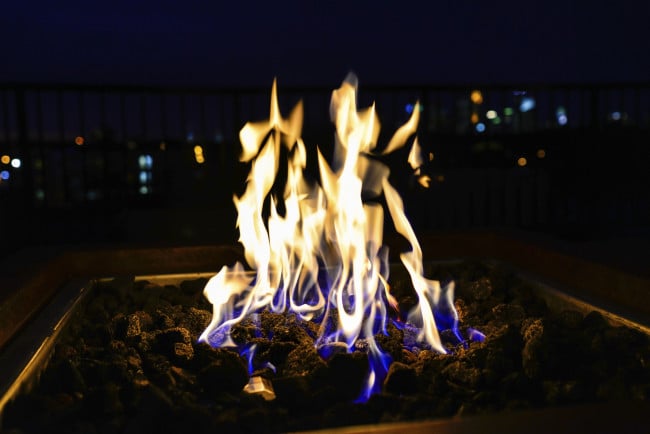Summer in the city: How to make NYC apartment living more bearable
- Boost your AC by using fans and keeping curtains or shades drawn against the sun
- Create white noise and invest in some earplugs and other sound-proofing materials
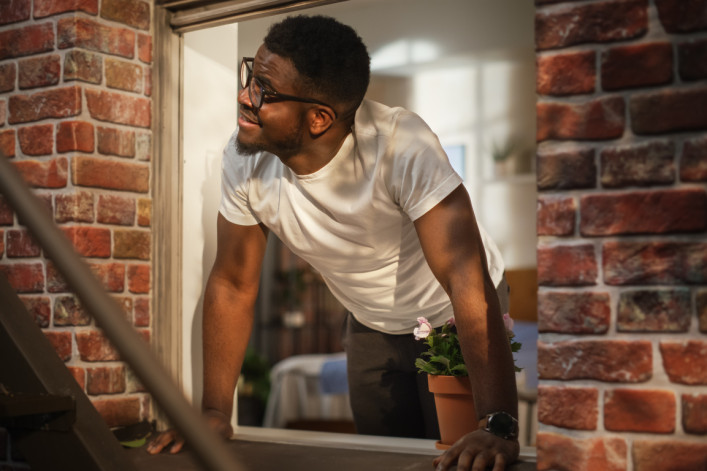
Most noise issues in NYC are neighbor complaints, and your best bet is to try to address the problem in person before escalating the situation.
iStock
Let’s say you’ve been out all day—or all night. Now you just want to come home and chill out. But in the summertime, New York City apartment living is not always easy.
Maybe it’s noisy, thanks to nearby outdoor dining or tenants hanging out on the stoop. Or your air conditioner is no match for 90 degree temperatures. Or your neighbors are barbecuing or smoking under your window and you can’t stand the smell.
But there are some tricks you can try, for example, using fans and blackout curtains to make your AC more efficient and block out noise and smoke. Acoustic tiles and soft furnishings can also help absorb sound. Read on for a compilation of Brick’s best summertime advice plus some of my own tips I’ve gained living in NYC for over 25 years.
Boost your AC's power
Air conditioners feel necessary for NYC’s swampy summers but they also use refrigerants, potent greenhouse gasses that are bad for the environment, which will ultimately making the heat worse. Plus small AC units may not be up to the task when temperatures approach the triple digits.
One solution is to boost your AC’s cooling effects, which will also enable it to cycle on a less frequently.
Here’s how to do it: Block the sunlight with dark shades or curtains—and keep them closed all day. Yes, your place will feel like a cave, but a cool cave is better than a hot cave. Blackout-quality curtains can also help insulate your place and keep the cool air in (and do the reverse in cold weather).
Circulation is your friend: Run a few fans to help move the AC-cooled air around. Aim one at the ceiling and keep another aimed directly at you. At all times.
Fun fact: It’s a very easy fix for an electrician or handyman to swap out an overhead lighting fixture for a combination ceiling fan-light fixture. Ask your landlord to make the switch; some are willing to do so because it’s an inexpensive way to add an amenity. (Look for models that are more flush to the ceiling. Ones that extend into the room on a stem tend to have an annoying wobble.)
Be prepared for more wildfire smoke
The risk of wildfires in Canada is high this summer, which has implications for NYC. Last summer, NYC emergency room visits spiked for asthma-related conditions on June 7th when wildfire smoke blanketed the sky.
There are a few steps you can take to protect the air quality in your apartment: Keep doors and windows closed and seal any gaps to the outside. It is safe to run your AC because air conditioners are designed to cool interior air, not draw air from the outside. Investing in an air filter will help keep the air clear, as well as remove allergens like pollen and dust.
You can use these tricks to keep out other types of smoke as well—for example from a barbecue, fire pit, cigarettes or pot. Legally speaking, fire pits are considered to be open fires, which are prohibited in the five boroughs. Barbecues must be 10 feet from the building and you can call 311 if someone is creating a fire hazard.
If your neighbor's smoke routinely affects your air quality, it could be considered a breach of the warranty of habitability, which protects tenants' rights to a safe and livable home. (Read this to find out the next steps to take.)
Be prepared for a blackout
The August 2003 blackout happened without warning and lasted a couple of days. It was a pretty dramatic experience. Here are a few things to consider from someone who lived through it in Manhattan.
If the entrance to your apartment building uses an electronic keypad or keyfob, you’ll need another way to access the building during a blackout, like a key to another entrance. Figuring this out now is a good idea.
Not someone who keeps a lot of food in their apartment? Consider stocking up on some shelf-stable nutrition. During the ’03 blackout, a restaurant in my neighborhood served a cheap buffet that was a lifesaver, but a nearby deli hiked its prices, which was super annoying.
Other things to have on hand: A radio with batteries so that you can get information, a first aid kit, and a flashlight with batteries, because you don’t want to drain the battery on your phone.
Weird but true: If NYC has another major blackout, guess what you’ll have to do? Clean out the melting food from your fridge and freezer. (I did this on the second day of the blackout.) If there’s expired stuff in there you might as well pitch it now.
Have pets? Make a plan for where you would take them to escape an overheated apartment, like visiting a friend who has private outdoor space, or a cooler ground floor unit or even decamping to the basement (usually cooler), if it is not too gross. In ’03, many people spent the night on the sidewalk, but I wouldn’t make that your primary plan.
Create white noise and add sound-absorbing furnishings
As someone who doesn’t tolerate noise very well, I pull out all the stops to make my own place as peaceful as possible, especially at night. (My building faces an expressway, and summer is peak drag racing time.)
Creating white noise with a fan works for me. I pop in my foam ear plugs when I work or need to sleep. I’ve been using cheap foam ones (10 pairs for $6), and they are adequate, but I have my eye on these Loop earplugs (one pair is $25).
Adding more soft furnishings to absorb sound can also help: Think thick rugs, wall hangings, and acoustic tiles. If you don’t want to spend a lot of cash check out thrift and second-hand stores for materials.
Pick your noise battles
Sometimes everything you do inside your apartment is no match for what’s going on, noisewise, outside your apartment.
NYC has extensive rules about noise, aka the Noise Code, and you can download this overview, which says that most noise issues are neighbor complaints (and Brick has written extensively on this topic).
Keep in mind your best bet is to first try to address the problem with a neighbor in person and work things out before escalating the situation by going to building management or the police.
One big caveat here: There are the laws and building rules, and then sometimes the culture in your building or in your neighborhood is to look the other way—for example being ok with loud gatherings late at night, or smoking on a building stoop.
Waging a one-person war against how things are done, even if you are in the right, is not going to win you any friends, and you may not win, period.
And you may be surprised how sometimes people are not aware their behavior is impacting you. They may be willing to shut the party down at an earlier hour—if you ask with respect. And sometimes your request is going to be denied or ignored. In that case you have to decide whether to make peace with the situation, fight it, or leave.
A Brooklyn tale about noise and smoking
Years ago I sublet a Brooklyn duplex apartment from a friend who had recently moved to the neighborhood and was going to be away for the summer. She cautioned me that her longtime neighbors hung out on their stoop next door and smoked at night. I could expect to smell cigarette smoke wafting into the bedroom until late at night. (Affirmative.)
Even though the smell was really bad, she told me not to say anything to them at all during our stay.
Think of it this way, she said: They have lived here for several generations, and we just moved here. Who are we to tell them what to do?
Besides, by being friendly, eventually she won them over and grew to appreciate how her neighbors looked out for her family and her property. They agreed to a curfew for hanging out on the stoop. Eventually, they moved away after selling the family home for a few million.
Now the block is quieter and smoke-free but without its neighborhood guardians.
You Might Also Like











